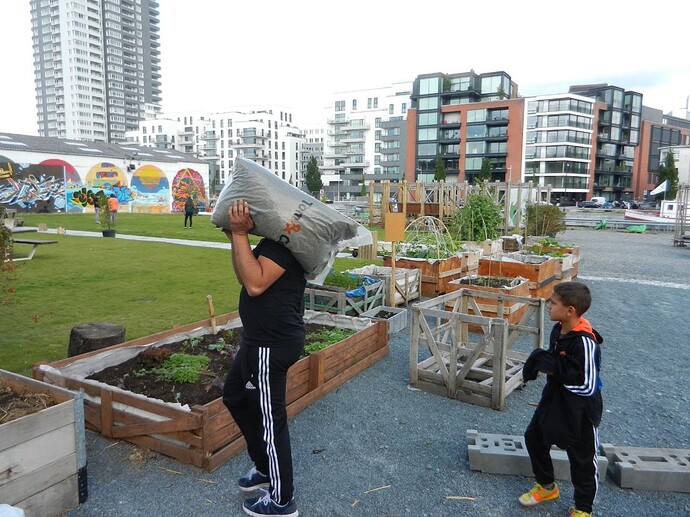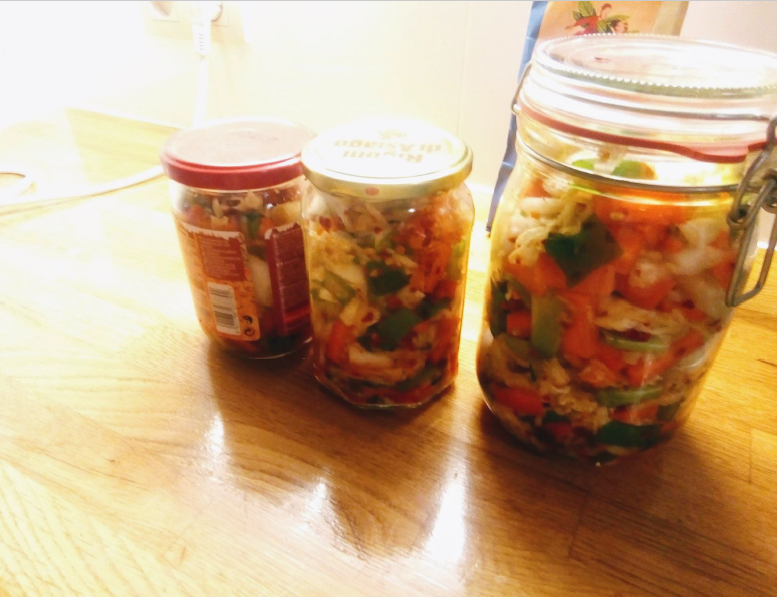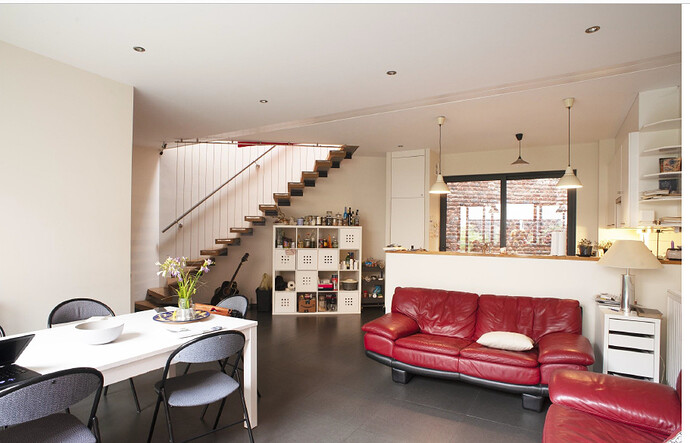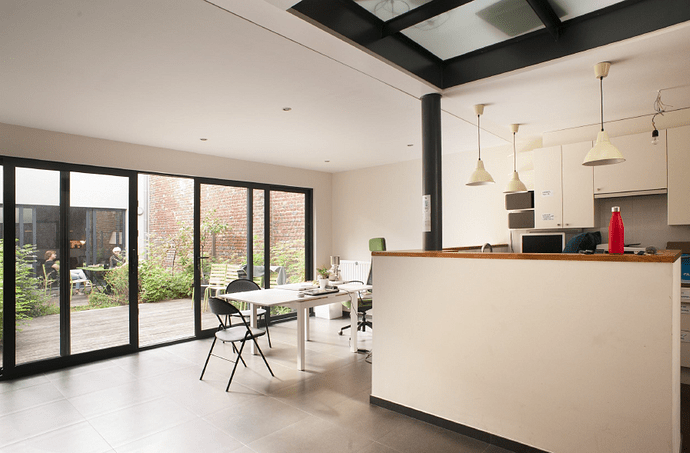Key insight: We need to have communities where people are willing to learn together, not be all the same.
9 participants + 1 facilitator. Special thanks to @ilaria @noemi @alberto @matthias @ugne @manuelpueyo Vincent, Malcolm et Gilles
Venue : ALLEEDUKAAI, a social and cultural space run by circular economy and social inclusion principles.
The discussion goes towards green living as a core value to implement in the Reef social lifestyle and building reconversion.
‘Do you think of yourself as someone who lives green?’, ‘Do you consider yourself to be a practical worker more than a brain worker?’, ‘Are you involved in growing plants or gardening?’
We asked such questions in the social introductions and most participants were fairly conservative in asserting themselves as ‘living green’, and most think of themselves as brain workers|. However, at least half responded that they grow plants or do a little gardening. This only goes to say that work around the household falls usually under hobbies, and that in the city people like to have a little green corner on the balcony, or improvised terrace.
Group work where everyone is a designer: We departed from individual experiences, but very quickly discussions arrived at the ‘HOW’: how those in The Reef would live together, how would trust be built, and which values, principles and processes could support healthy behaviors at the collective level.
The consensus was, like in the first workshop, that you need minimal principles on which people would agree from the start. We decided not to call them rules, because not abiding by rules involves punishment, which goes against the idea of acceptance of the other. But we need principles because ‘if you don’t set the base, you can’t change things’, said Ilaria.
Key insight: Living green relates to both individual and collective behaviours
Living green is not about the technology as much as one would think. @matthias pointed out that you can have
the best tech and people could still waste energy or viceversa: you can save 80% energy through behavior, even if you don’t have the green building.
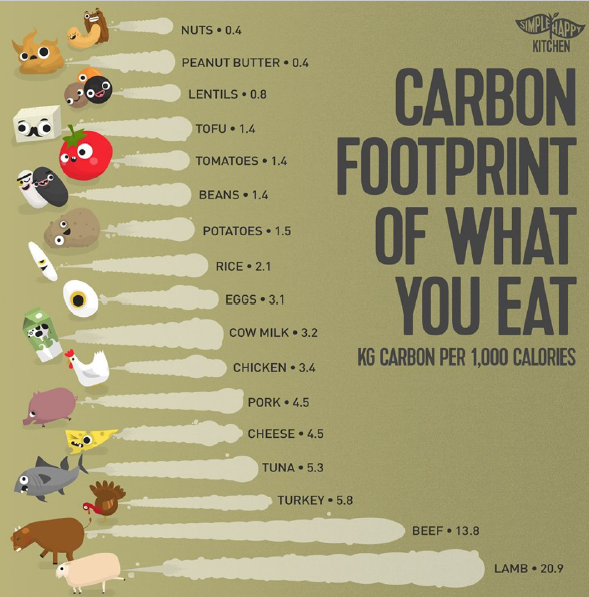
Living green as a social experiment
Shared examples of collective easy going processes of diving into green habits
- Living plastic-less: try a 1 month challenge and see how to consume less plastic. Over time it becomes easier.
- Making own food and cooking habits: fermenting things is the easiest to start (@noemi maybe the Reef will need your tips !)
- Waste management: composting, but also reusing water.
- The Reef as launchpad for “proximity workspaces”: Home offices reduce commuting. But could we make a stance to reduce city mobility by evolving the home office into a proximity office, where people are 5 minutes away from their office. This is also something for those in and around the neighborhood who might not be freelancers, but might be supported by their employers to work remotely (Alberto)
Strenghten the community agreement
The idea of The Reef would be that it would be a fluid space for experimentation, where you can make mistakes and learn from them (anyone’s mistakes!).
The Reef already exists in its first small version since 3 years ago: social interactions, housing, zero waste habits…all the seeds are already here in Brussels and led by the Edgeryders community
The bigger Reef which we are co-designing would be:
A place for sustainable relationships (Gilles)
A place for learning
A place where transmission of knowledge happens, and a place that builds legacy (@BaobabUrbain / Isabelle, strongly endorsed by @Ugne)
Each commitment needs values to implement collectively on a daily basis. Values that are important to begin with, as emphasized by the group:
- Acceptance, tolerance to difference
- Diversity: socio-economic, cultural, linguistic (especially highlighted by Manuel and Noemi) - ‘To put the diversity of the City of Brussels in a house’
- A prototyping mindset: continuous experimentation
How can we make buildings more sustainable? Reflections on the “Autonomous house”
Special Thanks to @matthias @malcolm @ilaria and Vincent <3
This was a hard topic to dive into. Framing the technical aspect of living green. The discussion was related to building materials, household appliances, the inhabitants’ “behavior of living” etc…
Malcolm shared views Influenced by Brent and Robert Vale’s book “The Autonomous House”, an influential book in the 1970s. They approached a house as an input / output device. An “earthbound spacecraft” that should be self-sufficient. They thought about the flows going in and out: air, water, sewage etc… And then how to minimize the flows.
The capital consumption (embodied energy etc.) to build a perfect building has to be considered when thinking if a building is ecological or not. (Comment by Ilaria: That’s the basic idea of circular economy.)
Insulation: Usually you’d first insulate, then heat (as much as still needed). But there are challenges: Adding wall insulation on the outside of existing buildings is a problem. Because it may inhibit windows from working. And if you add insulation on the inside, the thermal mass of the building is of not much use for keeping the room temperature constant.
The Reef as a vehicle for social inclusion and ecological relationships
Caring for the environment (the culture) is a closed, bourgeois club these days. It costs energy to choose ecological behavior. It has to open up. Changing behavior only happens when you see the value.
Not everyone has the passion for the environment. People need to see the value for their own lives to engage in ecological behavior.
Not to mention: with open source tech, ecology becomes affordable and accessible to anyone.
It happens that ecological shift might be refrained by cultural ties such as is rural Italy areas where wood burning is a common way of heating while remaining one of the most polluting. Advocacy was done to call for a change at first in public policy regarding heating system and then in household behaviours.
Vincent also pointed out how necessary it is to define to what degree or extremeness you want to be ecological with your building.
It’s easy to be extreme, in a way. But when it means that the comfort level drops too low, you have to warn people before they join, or visit.
Behavior setting theory is a nice framework for effecting behavior change by incentives in the physical environment. @matthias underlined that it could be well integrated into green buildings, as it deals with the connection between behavior and things that we found to be important for low-resource-use living.
Experiments from Low-Tech Magazine. enlightened powers and weaknesses on low tech solutions.
This 2nd workshop was a momentum on seizing collectively the green approach we’d like to implement in the Reef. Thank you all for your various, savvy and complementary insights <3 <3
What next? Coming to the CoDesign Sprint on 28 November?
Register here before 26 November:
Proposal: we assume that The Reef will happen in 2-3 years, and we put ourselves in the shoes of to-be inhabitants. We will ask practically: How do we design our living together life? What are the issues most important for you to clear out with others?
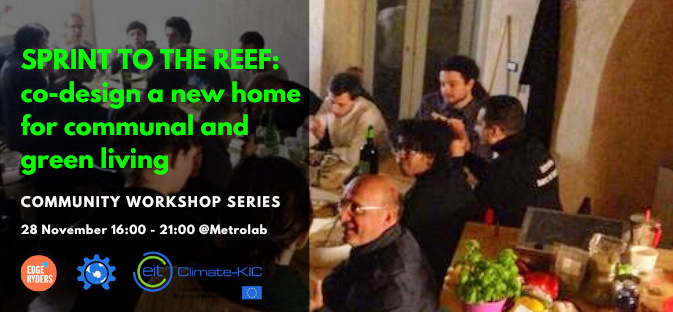
Venue: Metrolab Brussels
Address: Quai du Commerce 48 in 1000 Brussels
Metrolab Brussels (MLB) is a trans-disciplinary and inter-university laboratory for applied and critical urban research, funded by the Brussels Capital Region through its ERDF program (2014-2020).
Learn more
- The Reef website
- About Edgeryders
- About The Reef prototype: under way since almost 3 years.
This activity is supported by
